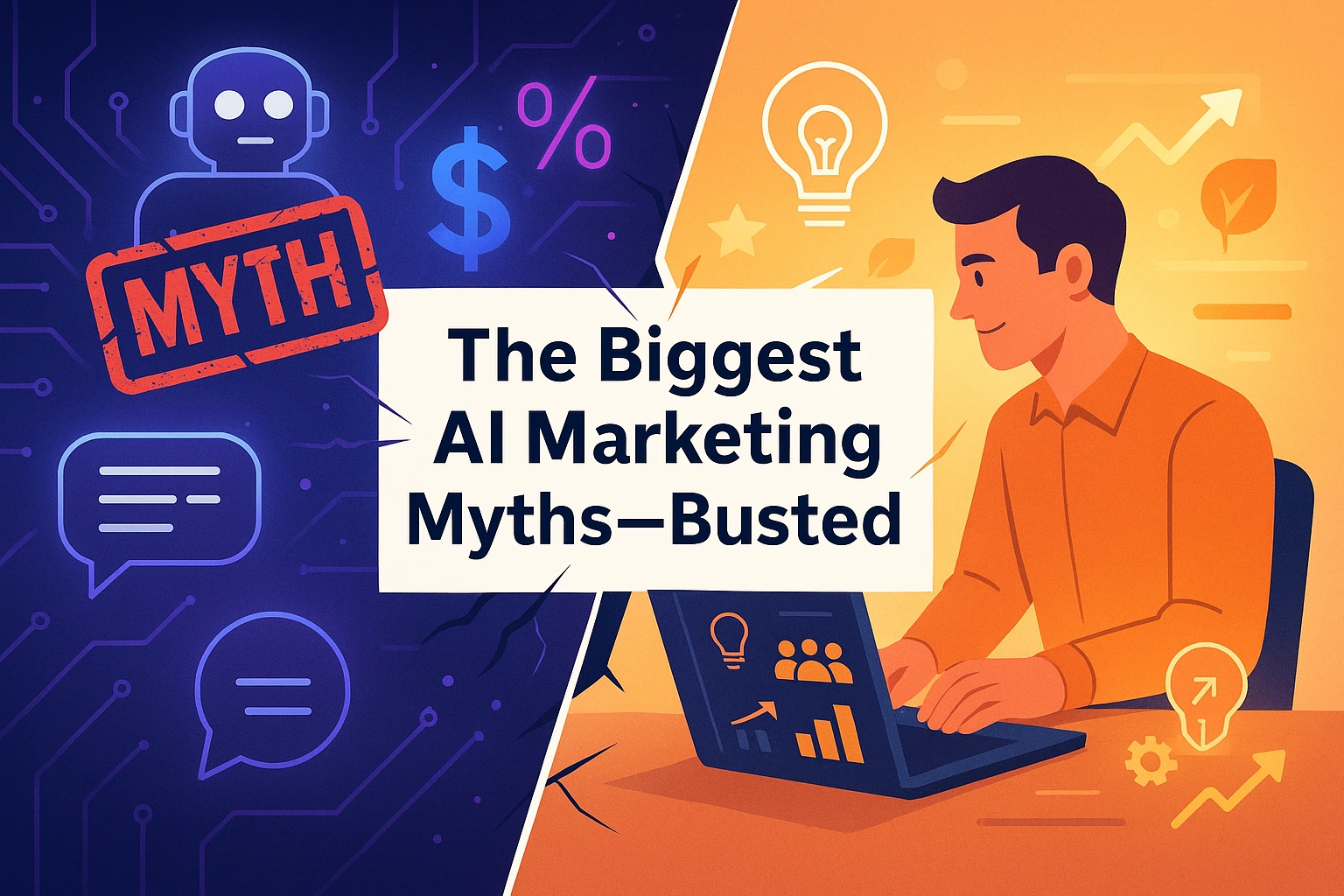AI is everywhere these days from your social media feed to your inbox to the chatbot that pops up when you open a website. As exciting as it is, it can also feel a little overwhelming.
With all the hype comes a lot of noise—endless opinions on what AI can (and can’t) do for marketing. And somewhere in that noise? Myths. Plenty of them, which stops people from actually using AI to its full potential.
Let’s clear the air and bust a few of the big ones.
Myth #1: “AI will replace marketers.”
Reality: AI enhances human capabilities — it doesn’t erase them.
If you’ve ever worried AI is here to steal your job — you need to stop
Think of AI as a calculator for marketing. Just like a calculator didn’t make accountants disappear, AI won’t erase marketers. It just takes care of the boring, repetitive stuff so you can focus on the high-value, creative work.
Imagine spending hours manually collecting blog topic ideas, keyword research, and headline variations. AI can knock that out in minutes, leaving you more time to focus on your brand strategy, clients, and messaging.
Myth #2: “AI is only for big companies with big budgets.”
Reality: AI adoption is accelerating fastest among small and mid-sized businesses.
Sure, tech giants like Google and Amazon are using AI, but so is the small coffee shop around the corner. Tools like ChatGPT, Gemini, and Midjourney are subscription-based, often cheaper than a single boosted social post.
If you’re a small business owner, you can use AI to:
- Write social captions
- Draft blog outlines
- Answer customer questions instantly
- Suggest local SEO keywords
- Create promotional graphics
It’s not about budget, but about knowing where AI fits in your workflow.
Myth #3: “AI content is low quality and generic.”
Reality: Output quality depends on input quality.
This one is half-true… if you use AI poorly.
If you type in “write me a blog about real estate,” you’ll get something that sounds like a Wikipedia page. But if you give AI a clear brief, examples of your brand voice, and specific goals, you’ll get content that feels original and on-brand.
Consider AI as a junior copywriter. The better the instructions you give, the better the output you’ll get, and it keeps learning.
Myth #4: “AI knows everything.”
Reality: AI isn’t all-knowing, and it’s not always right.
Nope. AI is not a magic crystal ball. It doesn’t know your customer’s inside jokes, your industry’s latest updates, or that your business just launched a new service—unless you tell it. It is smart, only when it’s fed with the data.
On top of that, AI models are trained on past information and have a cutoff point (for example, GPT-4’s was December 2023). And yeah, sometimes they’ll confidently spit out something that’s flat-out wrong—a “hallucination.”
That’s why fact-checking, verification, and applying human expertise remain essential.
So, What’s the Truth?
AI isn’t a threat or a fad. It’s a tool — and like any tool, it’s only as powerful as the person using it.
According to McKinsey, businesses that adopt AI in marketing see productivity gains of up to 40% but only when paired with strong human leadership.
The winners in marketing won’t be the ones who ignore AI or fear it; they’ll be the ones who learn how to make it work with them.
We’re not here to sell you AI tools or jump on the latest tech trend.
But we are here to help you make sense of the AI chatter—so you can focus on what really matters: getting more leads, creating better content, and running smoother workflows.
Because at the end of the day, AI doesn’t replace human creativity. It only amplifies it. In marketing’s next chapter, AI fluency will be as essential as digital fluency was a decade ago.

